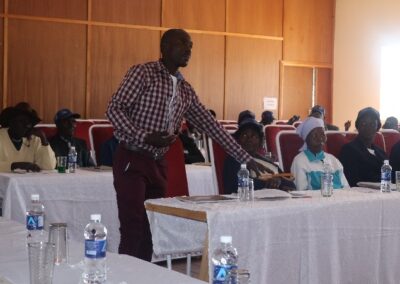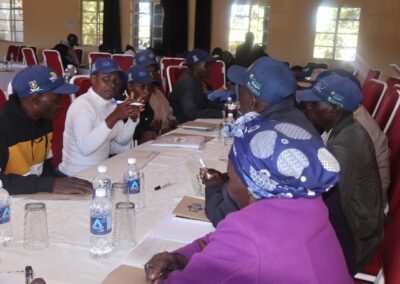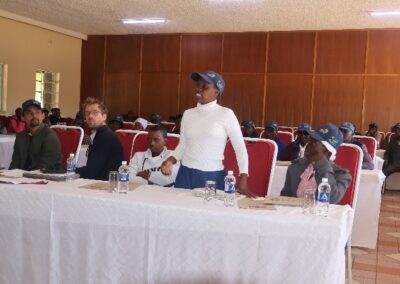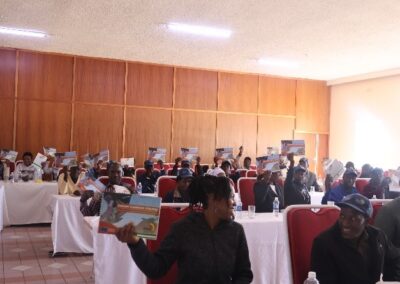Introduction
A workshop was convened with 45 farmers from both Murehwa (Ward 26 & 28) and Mutoko districts (Ward 8 & 10). The main agenda was to reflect on the previous cropping season with more focus on the usage of the PICSA approach to their farming activities together with access to climate information services as was provided through assistance from the Meteorological Services Department (MSD). More specially the action sought to review the PICSA process with farmers after the cropping season, and identify lessons for the future improvements:
- In what ways (if any) did farmers find the training and use of PICSA useful?
- Which parts of the PICSA process were the most helpful and why?
- Did the farmers make changes in their selection or management of crops, livestock or livelihood practices? e.g. did they try something new or do something different to previous seasons as a result of using PICSA?
- If farmers are happy to discuss these changes ask them to share their experiences –how things went, what they had to do to make the changes and how they may have improved their livelihoods. We can also learn if things have not gone well, and it would be good to ask whether there were any changes that did not work and why.
Farmer Feedback on the PICSA ApproachFarmers from both Mutoko reiterated that the PICSA approach:
- Improved their knowledge on farming based on weather forecasts and also gained knowledge on using a farm diary (record keeping).
- Information on weather and climate forecasts assisted farmers to select crops and varieties suitable for the forecasted season.
- Information on seasonal forecasts assisted farmers to plan for their farming activities for the season e.g if expecting low rainfall, planting in wet areas, fertiliser application.
- Knowledge of the approximate average of rainfall that is received in the agroecological region.
- Through the use of rain gauges farmers could determine when to plant and when to apply fertilizer resulting in maximum germination percentage and reduced fertilizer loses.
- Learnt to work together as a group of farmers (social capital) and knowledge on how to assess if the amount of rainfall is enough for planting with the use of rain gauges.
- Budgeting – resource allocation and knowledge of whether you are making a profit or loss.
- Crops – planted short season varieties according to the forecasts and for livestock – good practices to prevent animal diseases and vaccinating and dipping livestock
Agriculture Extension Officers’ Feedback
- The Agritex Officers benefited from the information on the historical climate analysis for their wards, looking at the changes in the rainfall patterns and how to interpret rainfall data (Improved record keeping skills of the farmers).
- The farmers in Mutoko district easily took up small grain crops after the training due to the understanding of changes in climate and what crops are suitable for their region.
- The farmers benefited from the forecasts information this season through reduced fertilizer loses as they were aware of when the rains would come.
- The participatory approach encouraged farmers to work together improving knowledge sharing and social capital amongst farmers.
- Farmers in the training groups became ambassadors for the Agritex Officers by sharing information with other farmers hence more farmers benefited from the forecast’s information, rainfall information from the rain gauges and climate smart adaptation practices shared at the training.
Agritex Officers, Mr Machanzi from Ward 26 in Murehwa (top left) and Mrs Kativhu from Ward 8 in Mutoko giving their remarks on the PICSA approach as was utilised in the RAIZ project
Reflections from the MSD
- Climate information is key for decision making even though weather forecast from MSD are perceived by farmers as not reliable but many stakeholders still wait for these forecasts to make key decisions for their activities.
- Farmers need to take seriously the weather forecast from MSD as they provide the general outlook of the cropping season which is adequate to make key decisions.
- Even though a drought season was predicted, February of the 2023/204 season was the worst in the living memory in the past 100 years going back to 1890. Yest, the month of February is the critical period when plants are flowering or are grain filling stage which is pertinent to potential harvest.
- On the 3-10 days forecasts, we clearly understand that they might not be local area/district/ward, but they are good enough an indication of the potential-exact amount of rainfall which is key for decision making and planning purpose






